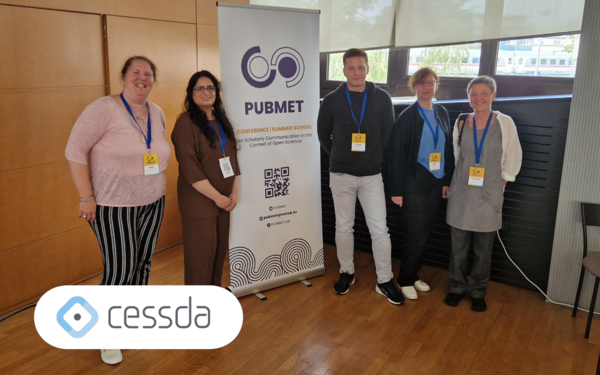
PUBMET 2025: Advancing Scholarly Communication and Data Practices
The PUBMET conference on scholarly communication in the context of open science has grown into a leading international forum for researchers, librarians, publishers, data professionals, and policymakers. Organised annually by the University of Zadar, PUBMET brings together experts to discuss how research communication, evaluation, and infrastructure can evolve in line with open science principles.
The 2025 edition once again offered a rich programme, with sessions covering topics such as research assessment reform, AI in scholarly publishing, responsible metrics, and open data practices. Among the highlights were two presentations from CESSDA (Consortium of European Social Science Data Archives), focusing on crucial aspects of research data management: fostering a culture of data citation and providing guidelines for sharing research data on human participants.
Fostering a Culture of Data Citation
Farah Karim & Christina Bornatici, CESSDA Data Citation Working Group
One of the persistent challenges in the scholarly ecosystem is that research data are not consistently treated as first-class research outputs. While datasets may underpin articles and policy reports, they are often poorly cited—or not cited at all—reducing their visibility and the recognition due to data creators.
Farah Karim presented the work of the CESSDA Data Citation Working Group (co-authored by Christina Bornatici), which is developing recommendations to strengthen data citation practices. Proper data citation includes essential elements such as:
-
Author(s)
-
Title
-
Publication year
-
Version
-
Data publisher
-
Persistent identifier (e.g. DOI)
Their message was clear: data citation is a collective responsibility. Researchers should adopt citation best practices, but publishers, repositories, funders, and institutions must embed requirements and provide the right infrastructure. Stronger citation practices align with the FAIR principles (Findable, Accessible, Interoperable, Reusable) and ensure transparency, reproducibility, and recognition for the often invisible labor of data stewardship.

Guidelines for Sharing Research Data on Human Participants
Marijana Glavica & Vedran Halamić, Croatian Social Science Data Archive
Data involving human participants bring enormous value for science and policy, but they are also complex to manage due to ethical, legal, and cultural concerns. Drawing on the COORDINATE project, Marijana Glavica presented new guidelines (co-authored by Vedran Halamić) designed to help researchers overcome barriers to sharing research data on human participants
Key challenges include:
-
Privacy and confidentiality risks
-
Informed consent complexities
-
Intellectual property issues
-
Resource limitations
-
Fear of data misuse or loss of competitive advantage
The guidelines address these head-on, offering practical strategies such as anonymization, controlled access, tailored informed consent, and clear data documentation. Importantly, they emphasize planning for sharing from the start—through strong data management plans, repository selection, and licensing decisions.
By reframing ethics and GDPR not as barriers but as frameworks for responsible sharing, the guidelines encourage researchers to make theirdatasets accessible while maintaining participant protection and trust.
The Guidelines for Sharing Research Data on Human participants are available on Zenodo, but this is still work in progress. It needs additional review before the first official version can be published.
Why These Talks Matter
Together, these two presentations highlight how the scholarly ecosystem can move toward a healthier data culture:
-
Citation ensures that data creators receive recognition and that datasets are traceable, measurable, and reusable.
-
Guidelines for sharing sensitive data ensure that ethically complex but valuable datasets can still contribute to science and society.
Both talks underline that sustainable change requires more than goodwill from individual researchers. Institutions, funders, repositories, and publishers must create policies and incentives that normalize responsible data sharing and citation.